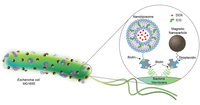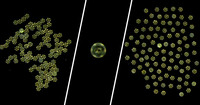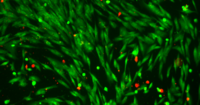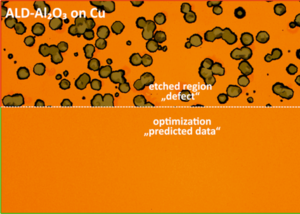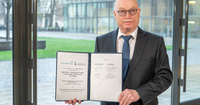News
Physical Intelligence
News
15-07-2022
Bacteria-based biohybrid microrobots on a mission to one day battle cancer
Scientists add artificial components to bacteria for better control and an extra therapeutic effect in seeking and destroying tumor cells
Birgül Akolpoglu
Yunus Alapan
Nihal Olcay Dogan
Saadet Baltaci
Oncay Yasa
Gulsen Aybar Tural
Metin Sitti
Physical Intelligence
News
07-07-2022
Young Researcher Award at the 11th European Solid Mechanics Conference
Tianlu Wang won the Young Researcher Award at the 11th European Solid Mechanics Conference, Galway, Ireland!
Tianlu Wang
Metin Sitti
Physical Intelligence
News
04-07-2022
Professor Xuanhe Zhao has been awarded the prestigious Humboldt Research Award
Professor Xuanhe Zhao from the Department of Mechanical Engineering and Department of Civil and Environmental Engineering at MIT, Cambridge, USA, has been awarded the prestigious Humboldt Research Award from the Alexander von Humboldt foundation:
Metin Sitti
Christoph Keplinger
Physical Intelligence
News
23-06-2022
Erdost Yildiz receives Marie Sklodowska-Curie Fellowship
Erdost Yıldız, a postdoctoral researcher in the Physical Intelligence Department at the Max Planck Institute for Intelligent Systems in Stuttgart, has been awarded a Marie Skłodowska-Curie European Postdoctoral Fellowship. The grant will allow him to conduct his postdoctoral research in Germany.
Erdost Yildiz
Metin Sitti
Richard Segar
Physical Intelligence
News
12-05-2022
New imaging method makes tiny medical robots visible in the body
Microrobots have the potential to revolutionize medicine. Researchers at the Max Planck ETH Centre for Learning Systems have now developed an imaging technique that for the first time recognises cell-sized microrobots individually and at high resolution in a living organism. This is an important step towards precise control of the robots and their clinical translation.
Paul Wrede
Metin Sitti
Physical Intelligence
News
26-04-2022
Microrobot collectives display versatile movement patterns
System capable of quick transitions between behaviors
Collective behavior and swarm patterns are found everywhere in nature. Robots can also be programmed to act in swarms. Researchers at the Max Planck Institute for Intelligent Systems, Cornell University, and Shanghai Jiao Tong University have developed collectives of microrobots, which they can move in every formation they wish. The research project was published in Nature Communications.
Gaurav Gardi
Wendong Wang
Metin Sitti
Physical Intelligence
News
29-03-2022
Meng Li selected to join the 71st Lindau Nobel Laureate Meeting
The postdoctoral researcher in the Physical Intelligence Department at the Max Planck Institute for Intelligent Systems in Stuttgart is one of 611 young scientists from across the world who are given the opportunity for a week of scientific exchange with some of the world’s greatest minds.
Meng Li
Metin Sitti
Physical Intelligence
News
28-02-2022
International Pharmaceutical Technology Symposium
Scientists from the Max Planck Institute for Intelligent Systems have won the “Best Oral Presentation Award” at the 20th International Pharmaceutical Technology Symposium with the research topic “Developing Theragnostic Microrobots for Active Drug Targeting and Hyperthermia Applications”. The theme of the symposium was “Shaping the Future of Pharmaceutics”.
Gulsen Aybar Tural
Metin Sitti
Physical Intelligence
News
03-02-2022
Physical Intelligence Department to cooperate with the Max Planck Queensland Center
Scientists participating in the research cooperation will explore extracellular matrices and their importance for medicine, ecology, and technology
Extracellular matrices are found in almost all living things and carry out various functions that could also become medically, ecologically, and technically relevant. However, relatively little research has been done on them. The scientists who joined forces in the Max Planck Queensland Center (MPQC) for the Materials Science of Extracellular Matrices at the beginning of 2022 want to change that. Extracellular matrices are not animate but can nevertheless provide cells with support, respond to changing environmental conditions, and store information that stimulates or inhibits cell growth. In various projects, different teams of the MPQC will investigate how the composition and order of these pillars of life enable their diverse functions.
Metin Sitti
Physical Intelligence
News
01-02-2022
On the spot drug delivery with light-controlled organic microswimmers
Scientists from the Max Planck Institute for Intelligent Systems and the Max Planck Institute for Solid State Research develop organic microparticles that can steer through biological fluids and dissolved blood in unprecedented ways. Even in very salty liquids, the microswimmers can be propelled forward at high speed by visible light, either individually or as a swarm. Additionally, they are partially biocompatible and can take up and release cargo on demand. The material properties are so ideal they could pave the way toward designing semi-autonomous microrobots applied in biomedicine.
Varun Sridhar
Filip Podjaski
Metin Sitti
Bettina Lotsch
Physical Intelligence
News
14-12-2021
Machine learning deployed to fast-track industrial optimization process
Joint research project between science and industry
An interdisciplinary team of researchers at the Max Planck Institute for Intelligent Systems, the Max Planck Institute for Solid State Research, the Technical University of Munich, and Robert Bosch GmbH deploy Bayesian Machine Learning methods to fast-track the optimization process of coating copper used in microchips. By doing so, the optimization process can be speeded up fifteenfold compared to taking a conventional optimization approach.
Gül Dogan
Sinan Ozgun Demir
Cem Balda Dayan
Umut Sanli
Utku Culha
Metin Sitti
Gisela Schütz
Kahraman Keskinbora
Physical Intelligence
Appointment
01-12-2021
Hakan Ceylan was appointed Assistant Professor at Mayo Clinic
Hakan Ceylan
Physical Intelligence
News
09-11-2021
Junghwan Byun receives Humboldt Postdoctoral Research Fellowship
The scientist working in the Physical Intelligence Department at the Max Planck Institute for Intelligent Systems in Stuttgart will be supported by the Alexander von Humboldt Foundation for two years to continue his soft robotic research in Germany.
Junghwan Byun
Physical Intelligence
News
07-07-2021
Roboter minimalinvasiv
Attached is the article in c’t magazine
Physical Intelligence
News
06-07-2021
Kirigami Metastructures: Liquid-Crystal-Elastomer-Actuated Reconfigurable Microscale Kirigami Metastructures (Adv. Mater. 25/2021)
Achieving wireless miniaturized reconfigurable metastructures remains a challenge due to the difficult nature of the fabrication and actuation processes at the micrometer scale. In article number <a href="https://onlinelibrary.wiley.com/toc/15214095/2021/33/25">2008605 </a>, Metin Sitti and co-workers develop an actuation platform for thermally reconfiguring micro-metasurfaces by using uniaxially aligned liquid crystal elastomers, which serve as efficient artificial muscles to provide energy for actuation of the microscale kirigami metastructures.
Mingchao Zhang
Hamed Shahsavan
Yubing Guo
Abdon Pena-Francesch
Metin Sitti
Physical Intelligence
News
21-06-2021
Savas Tasoglu receives Humboldt Research Fellowship for experienced researchers
A new guest scientist joined the Physical Intelligence Department at the Max Planck Institute for Intelligent Systems in Stuttgart with the support of the Alexander von Humboldt Foundation for twelve months to continue his microfluidics and biomaterials research in Germany.
Savas Tasoglu
Metin Sitti
Physical Intelligence
News
01-06-2021
Wei Feng receives Humboldt Postdoctoral Research Fellowship
The scientist working in the Physical Intelligence Department at the Max Planck Institute for Intelligent Systems in Stuttgart will be supported by the Alexander von Humboldt Foundation for two years to continue his soft robotic research in Germany.
Wei Feng
Metin Sitti
Physical Intelligence
News
29-04-2021
A modular building platform for the most ingenious of robots
Playground of new possibilities arises in constructing miniature soft-bodied machines
A team of scientists from the Max Planck Institute for Intelligent Systems (MPI-IS) have developed a system with which they can fabricate miniature robots building block by building block, which function exactly as required.
Jiachen Zhang
Ziyu Ren
Wenqi Hu
Ren Hao Soon
Immihan Ceren Yasa
Zemin Liu
Metin Sitti
Physical Intelligence
News
19-04-2021
MPI-IS participates in the Max Planck-University of Toronto Centre for Neural Science and Technology
Metin Sitti to cooperate with neurosurgeons to use his miniature robots as new tools in neurological diseases
Better therapies for diseases such as dementia or Parkinson's, as well as more powerful computers and new artificial intelligence technologies – these are the goals scientists will pursue at the Max Planck-University of Toronto-Centre for Neural Science and Technolgy. The center was officially inaugurated on April 14, 2021, in a virtual event with many prominent guests. Metin Sitti, Director of the Physical Intelligence Department at the Max Planck Institute for Intelligent Systems, also attended.
Metin Sitti
Physical Intelligence
News
16-03-2021
Metin Sitti and his team finalists for the 2020 Cozzarelli Prize
The highly prestigious annual Cozzarelli Prize recognizes outstanding contributions to the scientific disciplines represented by the National Academy of Sciences (NAS). Winners and finalists are chosen among articles that appeared in the journal last year in the six broadly defined classes under which the NAS is organized. Additionally, the Editorial Board has recognized six papers – one in each class – as finalists for the 2020 Cozzarelli Prize.
Metin Sitti
Hamed Shahsavan
Amirreza Aghakhani
Yubing Guo
Zoey Davidson
Physical Intelligence
News
08-03-2021
Jaekang Kim receives Humboldt Postdoctoral Research Fellowship
The scientist working in the Physical Intelligence Department at the Max Planck Institute for Intelligent Systems in Stuttgart will be supported by the Alexander von Humboldt Foundation for two years to continue his bio-inspired adhesive research in Germany
Jaekang Kim
Metin Sitti
Physical Intelligence
Appointment
01-03-2021
Sungwoo Chun will become Assistant Professor at Korea University
Physical Intelligence
News
24-02-2021
Shuaizhong Zhang receives Humboldt Postdoctoral Research Fellowship
The scientist working in the Physical Intelligence Department at the Max Planck Institute for Intelligent Systems in Stuttgart will be supported by the Alexander von Humboldt Foundation for two years to continue his soft robotic research in Germany.
Shuaizhong Zhang
Metin Sitti
Physical Intelligence
News
18-01-2021
Swimming soft millirobots to improve water quality monitoring in precision agriculture
SOMIRO project kicks off
Metin Sitti
Physical Intelligence
News
14-01-2021
Scientists remotely stimulate neurons in the brains of mice
This research could one day help limit the symptoms of Parkinson disease
Devices that electrically modulate parts of the brain are seen as breakthroughs in the management of neurological disorders such as Parkinson's disease. However, such devices require major surgery and expose a patient to the risk of hemorrhage or infection. Scientists have now created remotely powered nanoparticles that could one day become a less invasive method to modulate neurons in the brain. The researchers injected the tiny nanoelectrodes into mice and showed how they wirelessly transmit electrical signals to the brain, just like a deep brain stimulator would, after exposing the mice to an external magnetic field.
Kristen Kozielski
Hunter Gilbert
Yan Yu
Onder Erin
Metin Sitti
